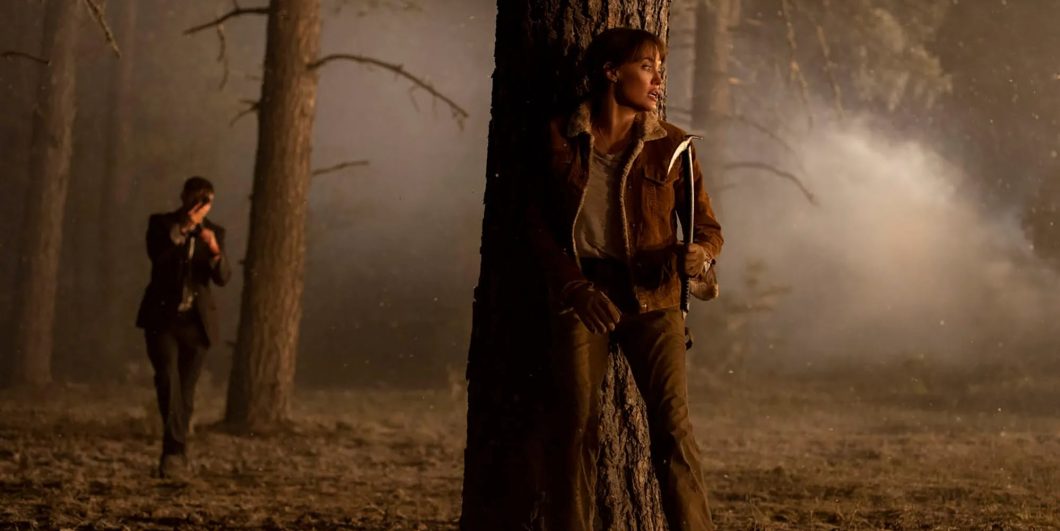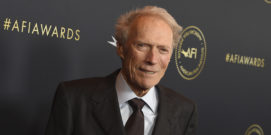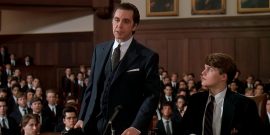Eastwood has dedicated himself to the restoration of the dignity of patriotism through the portrayal of American heroes.
Why Taylor Sheridan Is the Poet of Heroism
The poet of manliness in America in this generation is Taylor Sheridan, creator of the most popular show on TV, Yellowstone—or at any rate, our favorite, because it’s about freedom, cowboys, and love of family. Now, Sheridan has a new movie out, Those Who Wish Me Dead, starring Angelina Jolie and Jon Bernthal (The Punisher). It’s also set in the wilderness of Montana, but dealing with children and women rather than manly men, and nevertheless it favors the same view of America as the land of Stoic virtue, where harshness breeds strength and love.
Sheridan’s view of things, admittedly, seems nihilistic. The stories he writes and sometimes directs—Sicario, Hell or High Water—favor terrible violence and hardly entertain the possibility that justice rules in the hearts and cities of men. Perhaps, however, stories about violence are necessary to account for how violent Americans really are, how prone to anger. And perhaps we need to overcome the prejudice in favor of niceness and the imperative of happy ends, which tend to conceal our restlessness, dissatisfaction, and generational social crises.
Indeed, we are now going through one of these periods of social strife and we cannot say how it will turn out. This is one reason artists like Sheridan arise, to focus on one thing they know well and which speaks to our hearts, yet we feel we cannot say openly, because it’s not nice. Sheridan has spent the last decade trying to attract the attention of the conservative side of America to the imperatives of manliness, without, however, any great success. Perhaps it’s time we listened.
Those Who Wish Me Dead starts in the suburbs of Florida, where wealthy people live in an artificial paradise. A lavish home is blown up by two unfathomably wicked men (Aiden Gillen, from The Wire and Game of Thrones, and Nicholas Hoult, from Mad Max, X-Men). They move on to their next victim, but he, however, is not waiting around to get killed—he drives to Montana with his teenaged son (Jake Weber, from Zack Snyder’s Dawn of The Dead, and young Finn Little). There, his brother-in-law (Bernthal) is deputy sheriff in a small town—he might protect the son and publicize what the father has learned about the mob leader who sent the assassins (Tyler Perry).
This is the setup for a Western: The corruption of the city versus the wilderness, where there is no deception—no law and therefore no lawlessness. The father and son take the Lewis and Clark Trail and try to escape into the land of the free. We change the softness of the American Eden for the harshness of a land that dwarfs man, the forest and mountain that recall the primordial situation, or the world without human beings and our artificial powers. In Montana, the boy will get an education about being American and deal with the problem of human wickedness.
The father has one lesson to teach his son: If you get lost, find the waters—follow a creek to the river and the river to a city. This makes sense, but who would think of it? We don’t, or wouldn’t, because we don’t see the obvious, the necessary. The implication is that man lives in obedience to necessity—to laws that no one can break, not even criminals. Recalling our dependence on nature is the beginning of wisdom, because it concentrates our minds on what’s good for us, the knowledge and the protection we need, and this sets a purpose and limits to our freedom—it is therefore the beginning of morality, too. But then, when the father tries to teach his son morality, to justify himself for endangering him, he fails. The boy asks him: If you did nothing wrong, why are you afraid? This is the paradox of morality—we need to be moral, but we know that won’t defend us from the immoral. Getting to that purpose, to a decent life lived in light of what we know is our nature, is terribly difficult, it might even require sacrifices.
The proper education for this boy at the mercy of wicked men is the Western, with all its violence. You have to watch the movie for the experience—in an essay, all I can do is show the reasoning about manliness, virtue, and American politics, which is supposed to prepare the boy to be an adult, to be serious.
This all happens in Montana, where we find a different kind of American: Smokejumpers, men and women trained to parachute into forest fires to stop them. Instead of depending on vast, impersonal institutions, they personally face up to necessity, to deadly danger, in order to save the weak or unfortunate. There’s an image of heroism neglected by our celebrity culture! One reason they’re needed is that wicked men will stop at nothing to have their way, even provoking a holocaust which would be out of anyone’s control. As soon as we see these men, we can tell the world will be set on fire.
Before he can learn anything, the boy needs to survive, and that means he needs a savior. That’s our protagonist Hannah (Jolie). She’s a smokejumper, but her confidence was broken when she failed to save some people in a fire. She holds herself a coward—she does recklessly dangerous things that make for impressive stunts; she doesn’t know herself anymore and seems at times suicidal. Again, we see the paradox of morality: Had she died trying to save those people, she would obviously not have moral dilemmas or nightmares—but she didn’t run into the fire, and so she’s alive to doubt herself. She cannot be sure whether she acted wisely or cowardly, and she does not know whether she deserves to live, therefore.
The wicked men are assassins, brothers, and they have military training. They are a good reminder of what we would be without justice. They are mortal, admittedly, but they trust each other to face that weakness and have decided that since being human is strife and suffering, it’s better to inflict it than incur it. They are also deceivers, both in order to be safer themselves and in order to prove to themselves that people aren’t smart enough to stay alive. Their one idea is that you can always lie to Americans. Ideally, you pretend to be an authority figure and they will obey, or at least leave their guard down enough to come to ruin. Nobody expects wickedness and therefore if people feel uncomfortable or suspicious, they will blame themselves—they will interpret their fear as fear of authority, which all law-abiding people have, since they know their vulnerability. One needn’t be just to understand that justice involves punishment and therefore fear; that creates habits that are easily exploited.
In Montana, however, the assassins face adversaries—ordinary people, deceptively innocent, but who are able and willing to fight. The habit of treating ordinary people like animals led the assassins to despise mankind—now, they learn they have a fight on their hands, indeed, a fight to the death. The deputy sheriff, his wife, and the smokejumper are all serious enough to recognize and fear wickedness, and therefore they save themselves and can try to protect the boy.
The rest of the story introduces the boy to the natural situation—man’s strife in this world and man’s strife against man. There is not much talking, because speech introduces the possibility of deception—it’s dangerous to trust what you can’t see for yourself. Further, speech has a theoretical capacity, an attempt to understand things which abstracts from the distinction between life and death, which is the only thing that matters in a fight. The struggle between good and evil, furthermore, is eloquent enough by itself.
The boy depends on the smokejumper, who, although she is a woman, hardly behaves like a mother—indeed, she’s the manliest character, and therefore also the most arrogant. The assassins may be said to be less arrogant, since they try to deceive their victims. They don’t want to take the risk of a fair fight; they cannot comprehend the nobility of fighting a losing battle. This woman, however, behaves fearlessly and reveals the essence of manliness: Pretending to be immortal while risking one’s life. She is in that sense both mother and father to the boy—her love has the power to protect—both are needed to avoid the madness or despair induced by tyranny, when we see power and justice separated, become enemies.
Nobody expects wickedness and therefore if people feel uncomfortable or suspicious, they will blame themselves—they will interpret their fear as fear of authority, which all law-abiding people have, since they know their vulnerability. One needn’t be just to understand that justice involves punishment and therefore fear; that creates habits that are easily exploited.
Thus, a small story concerning a couple of anonymous people, by a series of accidents, turns into a confrontation between the principles of two political regimes. Montana represents American freedom, fighting to the death against tyranny; Florida represents the corruption of tyranny, a combination of deception and violence—people feel free until they are made to feel they are victims, enslaved to an arbitrary will whose power they cannot resist. We might call this a hysterical view of America, but is it not the perspective that naturally comes to all freedom-loving men and women, who are consequently armed, and are now growing as suspicious of police forces as they are of mobs burning down cities? And if it is their perspective, it cannot simply be dismissed as hysteria, because these are serious people, like the characters we see in the movie.
Sheridan isn’t looking to write a political allegory, but he is obviously speaking directly to the civil strife of our times when he makes the evil assassins impersonate various officials, including the FBI, and pursuing their quarry with military tactics; so also when he gives us a heroic trio of small town people fighting with the hunting rifles and other weapons that are part of their lives and work.
He wants to raise the question of natural justice, or man’s situation in the world. Accordingly, the last act of the movie features an astonishing series of catastrophes. We see a meadow during a lightning storm unlike anything you’re likely to have seen in cinema. We see the forests of Montana on fire, at night, the action lit by the approaching holocaust, the atmosphere increasingly hazy with flakes of ash. As though the whole world were involved in the fate of this boy, in the question whether our world provides for human virtue, or we’re fated to suffer evil.
Montana includes both human and natural evils. The natural evils can make men strong and thus can be said to be part of a divine order—they can lead to virtue and set limits to human evils, too. Human evil is harder to account for, but the poetry of manliness, which must include the wicked, not only the heroic, can also lead to virtue, by revealing the requirements of freedom and the dangers we face in standing up for ourselves and our principles. There is, after all, courage in seeing danger without flinching, not only in facing it.
As I said, this movie is less about men than women, because men after all risk their lives for women. Life must be good to be worth such suffering—life points to women both because they give birth and because they endure better than men. The suggestion seems to be that American men need to be humbled in a way, to be less destructive, while women need to be tougher, not least in order to bear the suffering men will inflict and incur. Indeed, women live longer and men are much more given even to suicide in America. Movies like this are just about our only public way to reveal this truth. Dealing with freedom is hard and it begins with this Stoic awareness of the inevitability of suffering and the necessity to bear it well, which is a form of moderation.



